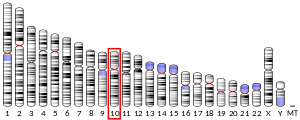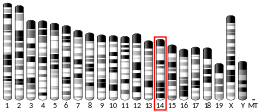Neuregulin 3
Neuregulin 3 also known as NRG3 is a member of the neuregulin protein family which in humans is encoded by the NRG3 gene.[5][6]
Function
NRG3 can bind to the extracellular domain of the ERBB4 receptor tyrosine kinase but not to the related family members ERBB2 or ERBB3. NRG3 binding stimulates tyrosine phosphorylation of ERBB4.[6]
Clinical significance
Variants of the NRG3 gene have been linked to a susceptibility to schizophrenia.[7]
It has also been linked to Hirschsprung's disease.[8]
References
- 1 2 3 GRCh38: Ensembl release 89: ENSG00000185737 - Ensembl, May 2017
- 1 2 3 GRCm38: Ensembl release 89: ENSMUSG00000041014 - Ensembl, May 2017
- ↑ "Human PubMed Reference:".
- ↑ "Mouse PubMed Reference:".
- ↑ "Entrez Gene: NRG3 neuregulin 3".
- 1 2 Zhang D, Sliwkowski MX, Mark M, Frantz G, Akita R, Sun Y, Hillan K, Crowley C, Brush J, Godowski PJ (September 1997). "Neuregulin-3 (NRG3): a novel neural tissue-enriched protein that binds and activates ErbB4". Proc. Natl. Acad. Sci. U.S.A. 94 (18): 9562–7. doi:10.1073/pnas.94.18.9562. PMC 23218. PMID 9275162.
- ↑ Chen PL, Avramopoulos D, Lasseter VK, McGrath JA, Fallin MD, Liang KY, Nestadt G, Feng N, Steel G, Cutting AS, Wolyniec P, Pulver AE, Valle D (January 2009). "Fine mapping on chromosome 10q22-q23 implicates Neuregulin 3 in schizophrenia". Am. J. Hum. Genet. 84 (1): 21–34. doi:10.1016/j.ajhg.2008.12.005. PMC 2668048. PMID 19118813. Lay summary – The Johns Hopkins News-Letter.
- ↑ Yang J, Duan S, Zhong R, Yin J, Pu J, Ke J, Lu X, Zou L, Zhang H, Zhu Z, Wang D, Xiao H, Guo A, Xia J, Miao X, Tang S, Wang G (January 2013). "Exome Sequencing Identified NRG3 as a Novel Susceptible Gene of Hirschsprung's Disease in a Chinese Population". Mol. Neurobiol. 47: 957–966. doi:10.1007/s12035-012-8392-4. PMID 23315268.
Further reading
- Benzel I, Bansal A, Browning BL, et al. (2007). "Interactions among genes in the ErbB-Neuregulin signalling network are associated with increased susceptibility to schizophrenia". Behavioral and Brain Functions. 3 (1): 31. doi:10.1186/1744-9081-3-31. PMC 1934910. PMID 17598910.
- Iijima M, Tomita M, Morozumi S, et al. (2009). "Single nucleotide polymorphism of TAG-1 influences IVIg responsiveness of Japanese patients with CIDP". Neurology. 73 (17): 1348–52. doi:10.1212/WNL.0b013e3181bd1139. PMID 19776380.
- Shrestha S, Irvin MR, Taylor KD, et al. (2010). "A genome-wide association study of carotid atherosclerosis in HIV-infected men". AIDS. 24 (4): 583–92. doi:10.1097/QAD.0b013e3283353c9e. PMC 3072760. PMID 20009918.
- Uhl GR, Liu QR, Drgon T, et al. (2008). "Molecular genetics of successful smoking cessation: convergent genome-wide association study results". Arch. Gen. Psychiatry. 65 (6): 683–93. doi:10.1001/archpsyc.65.6.683. PMC 2430596. PMID 18519826.
- Kimura K, Wakamatsu A, Suzuki Y, et al. (2006). "Diversification of transcriptional modulation: large-scale identification and characterization of putative alternative promoters of human genes". Genome Res. 16 (1): 55–65. doi:10.1101/gr.4039406. PMC 1356129. PMID 16344560.
- Gizatullin RZ, Muravenko OV, Al-Amin AN, et al. (2000). "Human NRG3 gene Map position 10q22-q23". Chromosome Res. 8 (6): 560. doi:10.1023/A:1009232025144. PMID 11032326.
- Panchal H, Wansbury O, Parry S, et al. (2007). "Neuregulin3 alters cell fate in the epidermis and mammary gland". BMC Dev. Biol. 7: 105. doi:10.1186/1471-213X-7-105. PMC 2110892. PMID 17880691.
- Wang YC, Chen JY, Chen ML, et al. (2008). "Neuregulin 3 genetic variations and susceptibility to schizophrenia in a Chinese population". Biol. Psychiatry. 64 (12): 1093–6. doi:10.1016/j.biopsych.2008.07.012. PMID 18708184.
- Révillion F, Lhotellier V, Hornez L, et al. (2008). "ErbB/HER ligands in human breast cancer, and relationships with their receptors, the bio-pathological features and prognosis". Ann. Oncol. 19 (1): 73–80. doi:10.1093/annonc/mdm431. PMID 17962208.
- Carteron C, Ferrer-Montiel A, Cabedo H (2006). "Characterization of a neural-specific splicing form of the human neuregulin 3 gene involved in oligodendrocyte survival". J. Cell Sci. 119 (Pt 5): 898–909. doi:10.1242/jcs.02799. PMID 16478787.
- Gratacòs M, Costas J, de Cid R, et al. (2009). "Identification of new putative susceptibility genes for several psychiatric disorders by association analysis of regulatory and non-synonymous SNPs of 306 genes involved in neurotransmission and neurodevelopment". Am. J. Med. Genet. B Neuropsychiatr. Genet. 150B (6): 808–16. doi:10.1002/ajmg.b.30902. PMID 19086053.
- Ota T, Suzuki Y, Nishikawa T, et al. (2004). "Complete sequencing and characterization of 21,243 full-length human cDNAs". Nat. Genet. 36 (1): 40–5. doi:10.1038/ng1285. PMID 14702039.
- Strausberg RL, Feingold EA, Grouse LH, et al. (2002). "Generation and initial analysis of more than 15,000 full-length human and mouse cDNA sequences". Proc. Natl. Acad. Sci. U.S.A. 99 (26): 16899–903. doi:10.1073/pnas.242603899. PMC 139241. PMID 12477932.
- Sonuga-Barke EJ, Lasky-Su J, Neale BM, et al. (2008). "Does parental expressed emotion moderate genetic effects in ADHD? An exploration using a genome wide association scan". Am. J. Med. Genet. B Neuropsychiatr. Genet. 147B (8): 1359–68. doi:10.1002/ajmg.b.30860. PMID 18846501.
- Deloukas P, Earthrowl ME, Grafham DV, et al. (2004). "The DNA sequence and comparative analysis of human chromosome 10". Nature. 429 (6990): 375–81. doi:10.1038/nature02462. PMID 15164054.
- Volpi S, Heaton C, Mack K, et al. (2009). "Whole genome association study identifies polymorphisms associated with QT prolongation during iloperidone treatment of schizophrenia". Mol. Psychiatry. 14 (11): 1024–31. doi:10.1038/mp.2008.52. PMID 18521091.
This article is issued from
Wikipedia.
The text is licensed under Creative Commons - Attribution - Sharealike.
Additional terms may apply for the media files.



